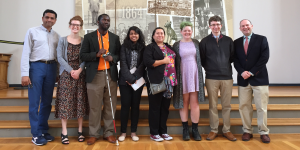News
Leveraging Partnerships to Enhance Accessibility, Diversity, and Inclusion in Curriculum
Working with industry, community, and LIS partners to create hands-on learning opportunities for students and revolutionize curriculum.

Dr. Jonathan Lazar (far right) and class visiting Dr. Raja Kushalnagar (far left) at Gallaudet University
Since its founding more than 50 years ago, the University of Maryland College of Information Studies (UMD iSchool) Master of Library and Information Science (MLIS) program has produced library and information professionals who are experts and innovators in utilizing information to benefit individuals and communities. The MLIS curriculum has been shaped since it’s inception by the UMD iSchool’s core values of accessibility, diversity, and inclusion. Today, the faculty and staff of the MLIS program continue this mission – leveraging industry partnerships and new technological advances – to expand the boundaries of how these values can be incorporated into LIS curriculum and into the work of LIS professionals. The faculty, staff, and students of the UMD iSchool are driven by a passion to create a more accessible and inclusive world through information. Here are just a few examples of their innovative approaches to this commitment.
In collaboration with the National Federation of the Blind (NFB), UMD iSchool Principal Lecturer Dr. Renee Hill is working to develop and enhance curriculum in the areas of accessibility, diversity, and inclusion at the UMD iSchool. She has dedicated much of her career to help foster independence and ensure equal access to information, education, and employment opportunities for blind and low-vision people. As director of the college’s School Library Specialization within the MLIS program, Hill has designed more than 20 unique, interactive courses preparing graduate students to become Library and Information Studies (LIS) professionals who are knowledgeable about diversity issues within the LIS field, particularly around information access for underrepresented populations.
Dr. Ana Ndumu, Assistant Professor at the UMD iSchool, focuses her research – and brings her learnings to the MLIS courses she teaches – on understanding the cross between social identity and information behavior as it pertains to immigrants living in the U.S. and the contributions of historically Black colleges and universities (HBCUs) to library and information science education. Ndumu has worked with the Counted In forum to help promote census participation among immigrant groups and facilitate the critical role libraries plan in census participation. She has also worked closely with REFORMA, an affiliate of the American Library Association (ALA), which aims to recruit more bilingual and bicultural library professionals and develop and promote more resources to meet the needs of Latino communities.
Along with Hill, Ndumu co-organizes the Conference on Inclusion and Diversity in Library and Information Science (CIDLIS) hosted by UMD, the first and longest-running event of its kind that is centered around equity, diversity, and inclusion in library and information sciences.
Dr. Paul Jaeger, Director of the MLIS program, had organized the CIDLIS for many years prior to Ndumu and Hill. Jaeger was instrumental in creating the Diversity & Inclusion specialization within the MLIS program which has been a critical addition to the MLIS curriculum offerings that endorse the importance of equal access to information by all members of society in the most inclusive terms possible. He is an acclaimed writer who has published 12 books and authored more than 150 journal articles and book chapters. Jaeger’s research focuses on the ways in which law and public policy shape information behavior, particularly for underserved populations.
Dr. Jonathan Lazar, Professor at the UMD iSchool, Trace Center Associate Director and core faculty member of UMD’s Human-Computer Interaction Lab, organizes opportunities for students in the UMD iSchool information and universal usability graduate course to travel to LIS institutions to understand the intersection of technology with information accessibility in real-world library settings. Students in his class in Fall 2019 visited the Maryland Library for the Blind and Print Disabled in Baltimore, the National Library Service for the Blind and Print Disabled at the Library of Congress in DC, the Gallaudet University library, and the Center for Accessibility at the DC Public Library, for hands-on learning experiences. These field trips exposed students to innovative technologies and approaches leveraged by LIS institutions to provide services and accessibility to people with disabilities. Dr. Lazar was originally involved in the creation of the Diversity & Inclusion specialization within the MLIS program, and gave guest lectures in the program, even before joining the faculty of the iSchool.
Additionally, MLIS students have capitalized on the UMD iSchool’s expansive and prestigious industry partnerships to pursue their research interests in accessibility, data literacy, diversity and inclusion, information access, the roles of libraries for underrepresented communities, human rights, and more. Many MLIS students, prior to graduation, have had their research featured in well-known publications as sole authors, including the Journal of Intellectual Freedom & Privacy, the International Journal of Information, Diversity, & Inclusion, and the Library Quarterly, the longest-running scholarly journal dedicated to library science.
Learn more about the UMD iSchool MLIS program by clicking the link here.
This article was written by Hayleigh Moore and originally posted to the iSchool website. Find the original article here.
